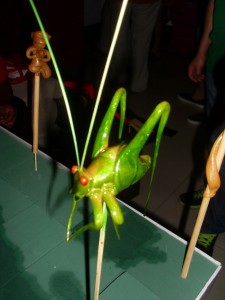 A few weeks ago I had the opportunity to spend a couple of days with Shifu. This is kind of rare for me — he is a busy guy, and I don’t get to talk to him very much outside of class. For that matter, I am usually so tuckered out after class, I don’t really seek him out. But a television show, sort of a variety showcase, asked Shifu to come and bring some of his students to be a feature on the show. So I got to spend time on the train and in the waiting room at the TV station just shooting the breeze with my master.
A few weeks ago I had the opportunity to spend a couple of days with Shifu. This is kind of rare for me — he is a busy guy, and I don’t get to talk to him very much outside of class. For that matter, I am usually so tuckered out after class, I don’t really seek him out. But a television show, sort of a variety showcase, asked Shifu to come and bring some of his students to be a feature on the show. So I got to spend time on the train and in the waiting room at the TV station just shooting the breeze with my master.
Lately our training seems to me to have shifted focus. We still do all the same physical training, but it has become mostly a vehicle for our internal emotional practice. So I asked Shifu, “If the goal of this is self-cultivation, why do we do martial arts at all? Why not just meditate or do yoga or something?” His answer was that there is no reason. It really doesn’t matter what you do, as long as you realize that the important thing is not to improve the skill but to improve yourself. Martial arts is really great, and offers lots of opportunity for this kind of development, but another pursuit might work just as well if you approach it with the right spirit. Indeed, “kungfu” in Chinese just means something you work hard at, and could really be any task at all.
It was cool that he said that, because there was a neat example of what he was talking about ready to hand. One of the other people being featured on the show was a sort of street performer/craftsman. He had a little tool box with a little stove warming a pot of molten sugar. He would blow the sugar much like a glass blower would blow glass, making a sort of balloon of it, and then shape it into any one of a menagerie of animals. He would grab up some hot sugar in his toughened hands, and calmly and peacefully pull it and shape it and chat and make jokes. Suddenly the animal would appear as if his hands had minds of their own and did not need him to guide them. More than anything one was impressed, sitting there watching him, by the atmosphere of calm and serenity that seemed to waft from him along with the fragrant smoke of his stove. It was clear watching him that this was a man who had, in the process of mastering his craft, mastered himself.
If I needed any further evidence of this man’s wisdom, we overheard a conversation between him and another performer on the TV show, a guy who rode bicycles across a tiny tightrope. The bicyclist saw me and my classmates and nudged the sugar sculptor, saying, “Foreigners are no good at Chinese kungfu, eh?” To which the sugar sculptor calmly replied, “Of course foreigners can do kungfu. Anyone can do kungfu.”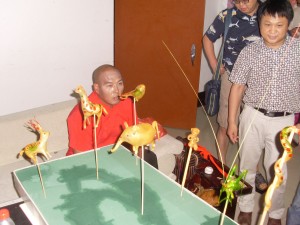
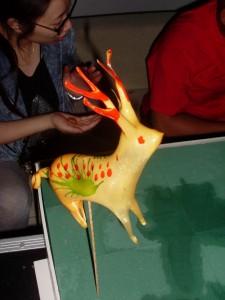

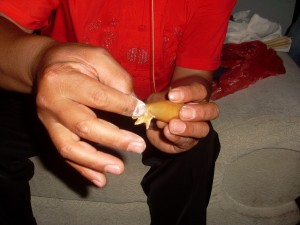
 Have you ever felt determined to do something or achieve a certain goal? If you have or if you have seen your child with that kind of determination then you know that it is not just in your head, but you can actually feel it in your body. Sometimes it is described as ‘fire in your belly’, or as a ‘hunger’ to accomplish the goal.
Have you ever felt determined to do something or achieve a certain goal? If you have or if you have seen your child with that kind of determination then you know that it is not just in your head, but you can actually feel it in your body. Sometimes it is described as ‘fire in your belly’, or as a ‘hunger’ to accomplish the goal.
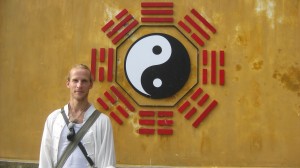
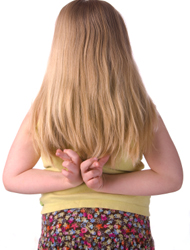
 All of us know that honesty is one of the qualities that we look for in our friends, work associates and close relationships. In fact it is a factor that is measured in those that run for political office and yet I cannot imagine anyone that I know that has not at some time not told the truth about something or withheld information that would have completed the story.
All of us know that honesty is one of the qualities that we look for in our friends, work associates and close relationships. In fact it is a factor that is measured in those that run for political office and yet I cannot imagine anyone that I know that has not at some time not told the truth about something or withheld information that would have completed the story.



